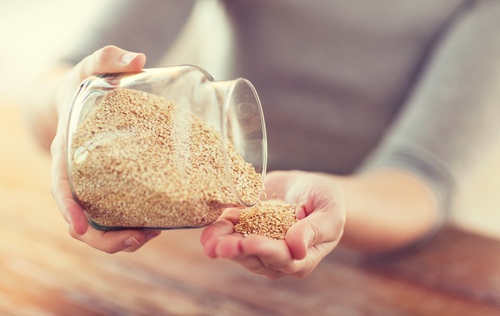Short answer
Quinoa is incredibly good for you, eat it as much as possible!
Recommended Alternative
Long answer
Quinoa is a high protein, nutrient dense ancient grain offering a ton of health benefits. While quinoa is nutritionally considered a whole grain, it is truly a pseudo-cereal. It is consumed as an intact grain seed without processing like other grains, although it can be ground into a flour to form other food products like pasta.
Nutritionally, quinoa contains a similar nutrient content as whole grains with a variety of vitamins, minerals, and fiber. These nutrients, along with its high protein of nearly 8 grams per cup, help to keep you fuller for longer decreasing overeating and snacking between meals. Less snacking and overeating can prevent obesity and the development of diabetes.
Quinoa is naturally gluten-free making it a great addition to meals for all - even those with Celiac disease. It contains a good dose of iron, B-vitamins, magnesium, phosphorus, potassium, calcium, manganese and vitamin E.
In a one cup serving, quinoa contains roughly 17% of the daily values for B1, B2, B5, B6, about 10% of folate and choline and 5% B3. B vitamins act as a necessary coenzyme in the Krebs cycle which produces energy in the body. Through vitamin B2 (riboflavin) this improved energy metabolism can reduce the frequency of migraines. B vitamins are also vital to the muscles, nerves and heart, along with regulation of the digestive system and production of red blood cells. B6 also helps to break down protein in foods.
Some of the minerals in one cup of quinoa include 58% manganese, 30% magnesium, 15% iron, 28% phosphorus, 18% copper, and 13% zinc. Manganese helps with both bone building and metabolism. Magnesium’s benefits are a long list including calming nerves/anxiety, relieving constipation and other digestive problems, regulating electrolytes, relieving muscle aches and preventing osteoporosis.
Quinoa also contains saponins, quercetin, and kaempferol. Saponins, a class of chemical compounds found abundantly in many plants, can lower cholesterol and reduce the risk of colon cancer. Quercetin and kaempferol are flavonoids which are anti-inflammatory, antiviral, cancer fighting, and anti-depressant.
With so many health benefits and few, if any, drawbacks, you really can't go wrong making quinoa a regular staple in your diet.
Need help choosing the right quinoa? This is our favorite.
Ingredients to be aware of
- high amounts of fiber
- oxalic acid

Benefits
- keeps you full longer
- contains vitamins and minerals
- decreased migraine headaches
- increased energy metabolism
- anti-inflammatory, antiviral, antidepressant
- boosts immune system
- improved digestion
- calms nerves/anxiety
- relieves muscle aches
- reduced cholesterol
- can prevent osteoporosis
- decreased risk of colon cancer
- gluten-free
Our Wellness Pick (what is this?)
Organic Tri-Color Quinoa
- Rich in protein
- Gluten-free grain
- Organic certified
- Non-GMO
- Versatile use
 Approved by
Approved by 















